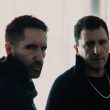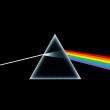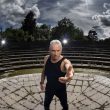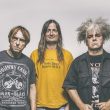Tesla, Brian Wheat Interview – ‘Son of a Milkman,’ Joe Elliott Friendship + More
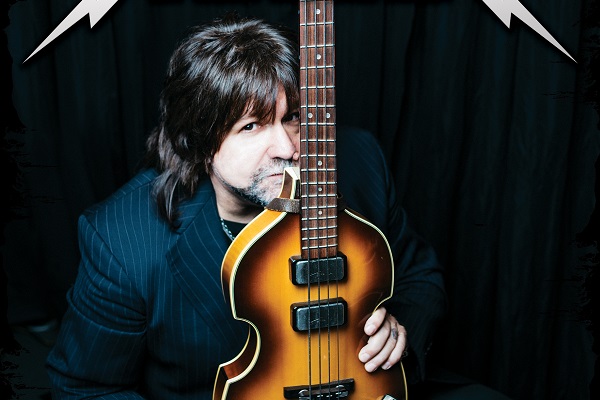
Brian Wheat – Story by Anne Erickson, book art courtesy photo
Tesla bassist Brian Wheat joins Anne Erickson to discuss his new memoir, friendship with Joe Elliott of Def Leppard, the latest on Tesla and more in this in-depth interview
Tesla bass player Brian Wheat opens up and tells his story in his a memoir, “Son of a Milkman: My Crazy Life with Tesla,” out this month. His tales of of anxiety, depression and bulimia show that rock stars are human, just like the rest of us, and have struggles. Wheat hopes his story, co-written with Chris Epting, helps those out there struggling with some of the issues he’s conquered. He also hopes the book makes people laugh a bit during this stressful year.
Wheat spoke with Anne Erickson of Audio Ink Radio about the new memoir, his friendship with Joe Elliott of Def Leppard, what it was like coming up during the MTV era, what’s new with Tesla and more. Read the full interview below, listen via the YouTube player and hear it via the Audio Ink podcast on Apple Podcasts here and Spotify here.
Anne Erickson: Brian, how have you been doing during this wild year?
Brian Wheat: Yeah, it’s been kind of nuts! Wear a mask, don’t wear a mask. Eat inside, don’t even inside. No concerts. Yeah. It’s been pretty crazy year, to say the least.
Congratulations on your new book, “Son of a Milkman: My Crazy Life with Tesla.” This is a very personal book. How did it feel to open up like this?
It was kind of liberating. I think it allowed me to let go of some of the stuff I kept inside for a long time.
Was there one story in particular that was extra hard to share?
No. Not really. I think once you put it out there, you just put it all out there. What you kind of get purging, it just kind of goes. I think once I made the decision to put some of it out there, letting it all go was no big deal.
What inspired you to do this book?
A couple things. I think it was getting, you know- I turned 58 this year. It’s getting to the point where Tesla has been a band for over 30 years. So, I thought if I was going to do my memoir, now would probably be the right time to do it, as I’m getting the latter part of my life. Then, the other thing was even early on, and I talk about it in the book, when I was in therapy with Dr. Herschkopf, he said to me that one day, I should consider writing a book because it’s therapeutic in terms of being able to let things go that you internalize.
Do you think the book might help some other people going through what you did?
Yeah- that was my hope. That’s my hope, is that when people take and read this book, they go, well, look, he’s just like us. He plays in Tesla, but he has anxiety or he’s insecure about his weight or he has autoimmune disease or he was bulimic or whatever, and he’s not ashamed to talk about it. Maybe it’ll help some people. That’s the ultimate goal. My my goal was to sit there and tell the story. Tesla, that was just part of it, because it’s part of my life.
It’s interesting that you bring up bulimia in the book, because I think a lot of people have that misconception that only women have eating disorders.
Yeah- I know, they think it’s just women, but no, it’s true. I think it’s anybody that has to be scrutinized in public. It’s lots of different- it’s not just women. For me, it was because I was going to be judged being on stage, and I didn’t want to be fat, because, you know. I mean, imagine back then, there wasn’t social media. I mean, people shame people so bad on social media now. They can say whatever they want. I imagine those cases are probably way worse than they were then. I was doing it where the only way you could be shamed was in a magazine or something. But, social media is just vicious.
I think that when you look at that era of music in the ’80s, you do think of women having a lot of pressure to look a certain way in the videos and have that model look. But, I think a lot of bands that had men in them, as well, during that era had pressure to look a certain way, because that image was a huge part of those bands.
Yeah- it was. Especially when we were coming up. You’ve got this MTV thing, and it was all about the image. But, also going through the thing about talking about how Tesla weren’t really an image band. We weren’t sexy guys, but we couldn’t be fat. So, that’s that’s what happened.
What do you think brought you through the dark period in your life?
My wife, Monique. I think she kept me from going over the edge. I met her at a time where Tesla had just broken up, and I was doing a lot of drugs. I could have went either way. She kind of got me back on a good path. So, I would say it was her that kind got me through that period of my life.
What advice would you have for someone who’s struggling with addiction or any of the stuff that you’ve been through?
Talk to somebody. Try to get some help. It’s not normal. It’s not healthy behavior. Try to share it with somebody you trust. Don’t be afraid to ask for help.
In the book, Joe Elliott of Def Leppard does the foreword, which is really cool. Tell me about your friendship.
Well, we were on tour with them in 1987 on the Hysteria tour, and one night and Glens Falls, New York, while we were doing the rehearsals, he was staying I guess next door to me and Frank, and he knocked on our door, and he came in, and me and him played a bunch of Paul McCartney and Wings songs, and we kind of bonded that night. We’ve been pals ever since.
What did Joe Elliott say when you asked him to do the foreword?
He said, “Sure!” He’s like my big brother. I mean, I’ve known him for since 1987. And, you know, whenever I need solid advice or need someone to talk to you about being in a band and the things that you have to do about being in a band and stuff, Joe is always the guy I call. So, he was happy to do it. He said, first he wanted to read the book, though. So, so he had to read the book before he’d write the forward.
You’ve had many big collaborations, and the book talks about some of your interactions with these other rock stars. Do you have a favorite?
Well, obviously by my relationship with Joe Elliott is pretty cool. He’s like my big brother. I’m real good friends with Jimmy Page, and that’s pretty special, that friendship. The guys in Def Leppard, we’re all kind of, there’s a kinship there. I think those are the real special ones. The other ones are just acquaintances. Those are pretty real.
Coronavirus (COVID-19) has obviously turn the world upside down this year. Do you have any idea when traditional shows might return?
If I knew that, I’d probably be a very rich man! No- I don’t know. I’m as in the dark as you are, honestly. I don’t know. I mean, I guess that depends on the people that are controlling us all and telling us this, that or the other.
What are your thoughts on losing the great Eddie Van Halen this year?
I think it’s a real, real sad thing. Losing Pete Way was a real sad thing, and losing Paul Raymond was a real sad thing. I mean, I think that any of us, we’re getting older, and we’re all starting to leave, and it shows you that we’re getting older, in general. And, it’s sad when any of us die.
Pete Way had to be a big loss for you. He’s such a great player.
Yeah. He’s one of my heroes, and he was a good friend of mine, as well. So, that was that was a tough one. But, like I said, they’re all tough. It’s tough when you see Eddie go. Eddie Money. I mean, there’s been so many that you just go, wow, we’re getting old.
It’s like all these rock heroes are one by one going away. It’s so sad.
Yeah- it is sad. But, it just shows that we’re all human and we’re all born and we live a life, and hopefully we leave a legacy and then we go. Then, who knows what happens after that. Hopefully, something good.
Is there any news on new Tesla music?
Yeah, no, no. We haven’t really even seen each other. I mean, I see Jeff every once in a while when I come to Sacramento to do some work in my studio. But, I haven’t seen Frank. I haven’t seen Dave, and I’ve seen Troy once since February of last year. So, we haven’t been together due to travel restrictions. We all have families and kids and elderly parents, so everyone’s kind of freaked out about Covid. So, no, there’s nothing nothing new in the works for me to talk about as we speak. I think the first thing we’ll do is get back together and play some concerts when we’re allowed to.
What do you hope people take away from your debut book?
I hope what people take away is that people who do struggle with anxiety or depression or autoimmune disorder or any of those things, that they can relate and it’ll maybe help them reach out to someone to talk to about getting some help for those things, especially depression and anxiety. Then, the other thing is, I hope they laugh a little bit. I hope they got my humor in it when I was writing it. I tried to do it so people could have a laugh and kind of lighten up the world in this serious situation we’re in, always. And, that’s what I hope they take out of it. The Tesla story’s kind of been told. It’s all there. I didn’t really say anything that that probably hasn’t been put out there. So, I hope they get, whatever. I hope it’s an entertaining read for whoever reads it.
- The Most Underrated Iron Maiden Album of All Time - July 12, 2025
- The Bands That Quietly Started the Grunge Rock Movement - July 9, 2025
- The Most Underrated Pearl Jam Album of All Time - July 4, 2025
Related Posts
- Tesla Announce Summer, Fall U.S. Tour Dates
- Tesla Frontman Jeff Keith on ‘Five Man London Jam,’ COVID-19 and More

